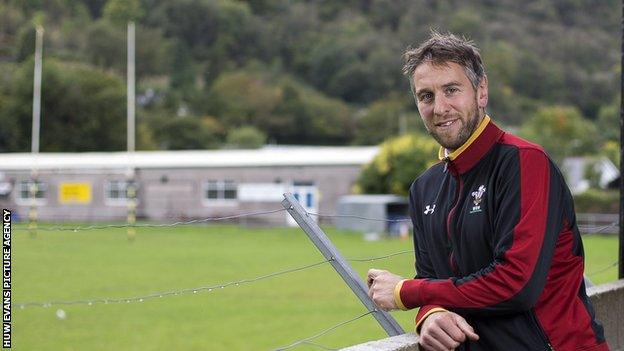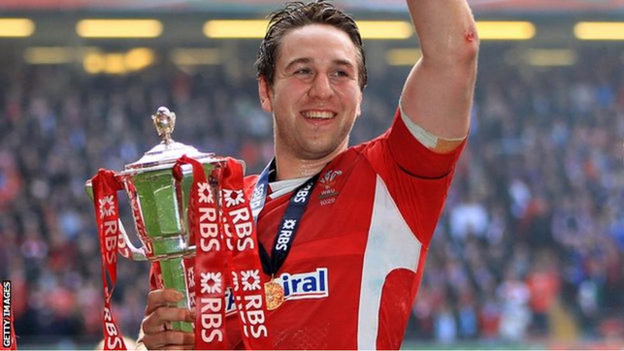Ryan Jones: Ex-Wales captain reveals early onset dementia diagnosis
- Published

Ryan Jones played for Newport, Bridgend, Celtic Warriors, Ospreys and Bristol
Wales' Grand Slam-winning captain Ryan Jones has revealed he has been diagnosed with early onset dementia.
The former back row and lock said he had also received the diagnosis of probable chronic traumatic encephalopathy (CTE) in December 2021.
He has now joined a legal action against rugby's governing bodies after specialists told him he was one of the worst cases they had seen.
Jones, 41, won 75 Wales caps and three more for the British and Irish Lions.
"I feel like my world is falling apart," Jones told the Sunday Times.
"And I am really scared. Because I've got three children and three step-children and I want to be a fantastic dad.
"I lived 15 years of my life like a superhero and I'm not. I don't know what the future holds.

Ryan Jones was a Grand Slam winner with Wales in 2005, 2008 and 2012
"I am a product of an environment that is all about process and human performance.
"I'm not able to perform like I could. And I just want to lead a happy, healthy, normal life.
"I feel that's been taken away and there's nothing I can do.
"I can't train harder, I can't play the referee, I don't know what the rules of the game are any more."
Jones skippered his country 33 times, including captaining the Grand Slam-winning team of 2008, before retiring from playing in 2015.
He took up the role of Welsh Rugby Union (WRU) performance director following his retirement, stepping down in October 2020.
The former Ospreys forward was initially diagnosed with depression and began to have short-term memory problems.
"It terrifies me because I don't know if, in two years' time, we're sat here and these episodes are a week long, two weeks long or permanent," added Jones.
"That's the fear, that's the bit that never leaves. That's the bit I can't shake off.
"Every episode I have also leaves a bit of a legacy. Everything we cancel, every relationship that I poison or don't have time for anymore, just makes it a little bit tougher to cope.
"I don't know how to slow that down, make it stop, what to do."
In May, the Alzheimer's Society established partnerships with organisations including the Rugby Players' Association to provide a permanent way of referring any player or manager who has either been diagnosed with dementia or is caring for a loved one.
Jones maintained he would not change his experiences of "living the dream" of playing for Wales but believes the sport of rugby union needs to do more to help take preventative measures.
"It is walking headlong with its eyes closed into a catastrophic situation," he said.
Jones 'courage' and 'bravery'
A WRU spokesperson said: "Ryan Jones has made an enormously positive contribution to Welsh rugby, both on and off the field, and it has been incredibly tough to hear about his current health problems.
"Player welfare is a central focus of everything we do at the WRU, we care deeply about our players and are fully aligned with World Rugby in constantly striving to safeguard and support them.
"We commend Ryan for speaking out on this important issue. We send our heartfelt sympathies to him and his family and will, of course, be making direct contact with him."
World Rugby will not comment on the on-going legal action, but in a statement said it "appreciates that it will have taken great courage for Ryan to speak so candidly about his personal circumstances. We were saddened to read his story".
The global governing body added: "We care deeply about every member of the rugby family and constantly strive to safeguard and support our players, driven by a clear commitment to further cement rugby as the most progressive sport on player welfare.
"Rugby is a leader in sport in the identification, prevention and management of head injuries, always acting on the latest science, evidence and independent expert guidance. We never stand still and proactively fund research, embrace innovation and explore technology that can make the sport as accessible, inclusive and safe as possible for all participants.
"We make available a wide range of support for former players, including free access to brain health consultation with leading experts, mental wellbeing education and advice.
"We will continue to do everything we can to look after our players and former players because rugby is a sport with such positive health and wellbeing benefits and you don't leave the rugby family when you hang-up your boots."
Campaign group Progressive Rugby also commended Jones on his "bravery" in publicly addressing his heath issues.
"The focus must now be on learning the lessons and ensuring that current and future players are protected from the same debilitating fate," the organisation, external said in a statement.
"It is time for everybody involved in the game to prioritise individual player welfare. If that means protocols erring on the side of caution and players being rested and missing games, it is a small price to pay to try and protect the long-term health of its participants.
"We can, and must, make the game of rugby union as safe as possible so that future generations aren't deprived of all the wonderful things it can offer."